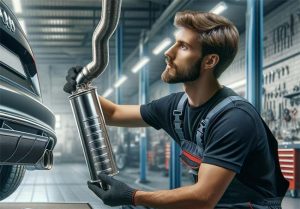The relationship between exhaust systems and horsepower in vehicles is a complex and often discussed topic among automotive enthusiasts. The exhaust system of a vehicle is not just a pathway for expelling combustion byproducts; it plays a significant role in the performance of the engine. The efficiency of an exhaust system directly impacts the engine’s ability to breathe, thereby affecting its power output. A well-optimized exhaust system can enhance the expulsion of exhaust gases, leading to potential increases in horsepower, particularly at higher revolutions per minute. This article aims to delve into the intricacies of exhaust systems and explore their impact on enhancing engine performance.
The Role of Exhaust Systems in Engine Performance
The exhaust system is an essential component in managing engine efficiency, primarily concerning the expulsion of exhaust gases. The key to an efficient exhaust system lies in its ability to minimize backpressure, which is the resistance that exhaust gases face as they exit the engine. Lower backpressure allows the engine to expel exhaust gases more freely, reducing the energy required for this process. This efficiency can lead to an increase in horsepower, especially noticeable at higher engine speeds where exhaust production is more abundant. An effectively designed exhaust system ensures that the engine can perform optimally without being hindered by its own exhaust gases.
The Impact of Exhaust System Design on Horsepower
The design of an exhaust system is critical in determining its effectiveness in boosting horsepower. Key design elements include:
-
Pipe Diameter: The diameter of the exhaust pipes influences the volume of exhaust gases that can be expelled. Larger diameters typically allow for a greater volume of gas to flow, reducing backpressure.
-
Exhaust Manifold Design: The manifold collects exhaust gases from the engine cylinders and directs them into the exhaust system. An optimized design ensures efficient gas flow.
-
Muffler and Resonator Configuration: The design of the muffler and resonators affects how freely gases flow through the system, impacting backpressure and overall performance.
-
Material Quality: The materials used in the exhaust system affect its durability and ability to withstand high temperatures, which is vital for maintaining optimal performance over time.
Understanding these design aspects is crucial for anyone looking to enhance their vehicle’s performance through an exhaust system upgrade. For specific vehicles, like the Ford 6.0 Power Stroke engine, selecting an exhaust system that complements the engine’s characteristics is vital. In another of our articles, we delve into the best exhaust for 6.0 Power Stroke, providing insights for owners looking to maximize their vehicle’s performance.
Conclusion: Unlocking Your Vehicle’s Potential
In conclusion, exhaust systems play a crucial role in enhancing the horsepower of a vehicle. By effectively reducing backpressure and optimizing the flow of exhaust gases, these systems significantly improve engine efficiency and power output. The impact of a well-designed exhaust system extends beyond mere horsepower increase. It contributes to the overall driving dynamics, potentially enhancing throttle response and engine sound, thereby elevating the driving experience. For car enthusiasts and daily drivers, understanding and selecting the right exhaust system is key to achieving desired performance improvements. It’s an investment in your vehicle’s capabilities, ensuring it performs at its best, and providing an enjoyable driving experience with each journey.


 Pipe Diameter: The diameter of the exhaust pipes influences the volume of exhaust gases that can be expelled. Larger diameters typically allow for a greater volume of gas to flow, reducing backpressure.
Pipe Diameter: The diameter of the exhaust pipes influences the volume of exhaust gases that can be expelled. Larger diameters typically allow for a greater volume of gas to flow, reducing backpressure.